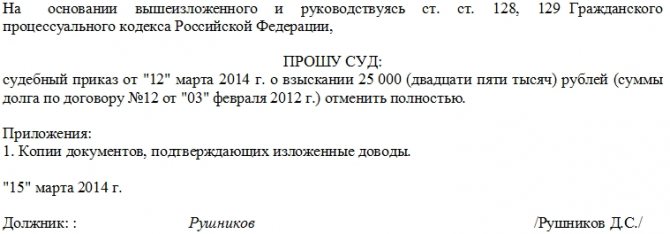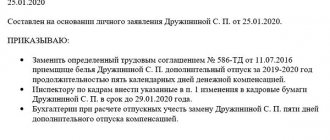Imagine the situation: you come home, open your mailbox, and there is a letter from the court. Yes, not just a letter, but a copy of the court order for debt collection. Which in itself is a sufficient reason to panic, especially if you are not very knowledgeable in law. Then the question inevitably arises: what to do?
And really, what should a citizen do when faced with a similar situation? Is it possible and how can I legally challenge a court order? In what cases is it issued? Why is this method of debt collection so popular among management companies? And most importantly: what to do if the deadline for filing an objection is missed?
Let's try to figure it out. But first, let’s define the very concept of a court order.
What kind of document is this?
According to the Code of Civil Procedure, a court order is a single decision of a judge to collect money or to reclaim the movable property of a debtor for claims that are indisputable. Namely:
— on the collection of wage debts;
- payment for housing and communal services;
— for obligatory payments of the homeowners’ association;
- on the collection of alimony;
- in case of violation of the contract.
Moreover, the amount of debt or the value of property should not exceed 500 thousand rubles for civil cases and 400 thousand for arbitration cases.
An important nuance: a court order is not only a court order, but also at the same time an executive document. In other words, for bailiffs this order is the basis for starting enforcement proceedings.
How to overturn a district court decision?
The district court's decision can be overturned on appeal. It is possible to appeal the decision of the court of first instance through the appellate and cassation procedures, as well as through supervisory proceedings.
to overturn a decision of a court of first instance in an appeal and cassation procedure in any type of legal proceedings, civil, arbitration, administrative and criminal.
How to overturn a district court decision by filing an appeal?
The deadline for filing an appeal is 1 month from the date of the final decision of the district court
That is, within a month, the decision of the district court is considered not to have entered into legal force and does not carry legal consequences; it can be canceled . For example, the Plaintiff, when a decision is made in his favor, cannot obtain a writ of execution from the court and transfer it to the bailiffs to initiate enforcement proceedings. The decision of the district court is considered to have entered into legal force if, within a month, none of the parties filed an appeal or tried to overturn the decision of the first instance court .
However, the decision can be appealed even after a month, if the person who submitted the complaint can justify the valid reason for missing the appeal period.
The appeal is filed through the district court , which made the appealed decision , it must be addressed to a higher court - if the decision was made by a magistrate, then the appeal will be considered by the district court, and if it is necessary to appeal the decision of the district court , we contact the city, regional, regional and etc..
The result of consideration of the case by the appellate instance is an appeal ruling, with the adoption of which the court decision comes into force.
The following decisions may be considered for considering a complaint: – the court may leave the decision of the court of first instance unchanged and the appeal without satisfaction; – the appellate authority can cancel or change the decision of the district court in whole or in a certain part, and make a new decision on the case; – the decision of the court of first instance may be canceled in whole or in part and the proceedings in the case are terminated or the application is left without consideration in whole or in part; – the complaint may be left without consideration on the merits if the document is filed after the expiration of the appeal period and the issue of restoring this period has not been resolved by the applicant.
How to overturn a district court decision by filing a cassation appeal?
It is possible to cancel a decision of a district court , cancel a decision of a court of first instance or an appeal ruling, or both at once through the cassation procedure in the second instance of cassation.
The appeal period is 6 months from the date of entry into force of the decision of the court of first instance.
Within 6 months, you must have time to file both cassation appeals to overturn the decision of the court of first instance .
A cassation appeal is filed with the Presidium of the Supreme Court of a Territorial or Regional Court, a court of the Republic or a federal city, a court of an autonomous region or an autonomous district.
A cassation cannot be filed without going through the appellate authority.
In order for the cassation instance to suspend the execution of the appealed judicial acts, the party filing the complaint must send a petition to the court.
Options for making a decision on a cassation appeal may have the following meanings: – the decision of the court of first or appellate instance may be left unchanged, and the complaint not satisfied; – the decision of the court of first instance or appellate instance can be canceled in whole or in part, and the case is sent for a new trial to the appropriate court.
In this case, the cassation instance may indicate the need to consider the case in a different court; – the cassation instance may leave in force one of the court decisions adopted in the case; – a decision of a court of first instance or an appeal may be canceled or amended, and a new court decision may be made in the case if an error was made in the application and interpretation of substantive law; – a cassation appeal may be left without consideration on the merits if there are grounds provided for in Art. 379.1 Code of Civil Procedure of the Russian Federation.
How to overturn a district court decision by filing a second cassation appeal?
You must appeal to the second cassation instance if the six-month appeal period has not been exceeded and the first stage of cassation has been completed.
The cassation appeal is filed with the Judicial Collegium of the Supreme Court of the Russian Federation.
The received cassation appeal is initially examined by a single judge, who decides to transfer or not transfer the case to the collegium. At the same time, the Chairman of the Supreme Court of the Russian Federation or his deputy may disagree with the refusal to transfer and cancel it.
Options for considering a case on a cassation appeal: – The complaint can be returned without consideration on the merits – the deadline for appeal has been missed, jurisdiction has been violated, the original or a copy (notarized) of the representative’s power of attorney has not been attached, etc.
If the appeal period is not missed, the complaint can be resubmitted, eliminating the violations. – A ruling was made to refuse to transfer the complaint for consideration at a court hearing of the appropriate authority. – A ruling has been made to transfer the cassation appeal for consideration in the cassation court and for this court to issue a ruling or ruling on the case.
At this stage, it is the ruling of the cassation authority that was issued during the consideration of the complaint that is appealed. A refusal to submit a complaint for consideration cannot be appealed.
However, when making a ruling to refuse to transfer the complaint for consideration, the applicant may send a letter to the Chairman of the RF Supreme Court or his deputy, who may disagree with the judge and cancel it.
How to get a court order?
To do this, it is enough to apply to the court and attach supporting documents. For example, management companies usually attach an extract from the personal account of the debtor.
In most cases, the application is accepted. It can be returned only if it is incorrectly executed, there is no evidence proving the debt, or when the court needs to ask the parties additional questions. Moreover, the return occurs quickly - within 3 days after submission.
How to cancel a tax order?
If the tax service sues you, then you can disagree and write an objection to their statement. The procedure will not differ from the standard one. Most often, the tax service applies for the collection of insurance and pension contributions.
How to cancel a court order for housing and communal services?
Utility companies sue when debts reach enormous proportions. In addition, there are cases when they are calculated incorrectly. If you do not agree with the calculation of your management company, then first you need to contact the court that issued the act against you. After this, you can initiate legal action or wait until a lawsuit is filed against you in a court of general jurisdiction.
Advantages for creditors
It significantly saves their time and finances.
Namely:
— the decision is made within 5 days from the date of filing the application;
— accepted without judgment. proceedings;
- after the issuance, the claimant can receive an order from the court and immediately send the court. bailiffs;
— the state duty is lower than in claim proceedings;
— there is no need to pay for the services of representatives and transportation costs, since there are no lawsuits. proceedings.
What to do if the time frame allotted for challenging is missed?
If the 10 days allotted for challenging a court order are missed, a petition is filed with the court to restore the period, with a mandatory indication of a valid reason.
Such reasons may be confirmed by:
— documents confirming the failure to receive a copy of the court order due to violations of the rules for the delivery of postal items;
- documents confirming the failure to receive a copy of the court order due to the debtor’s absence from his place of registration (for example, due to illness or business trip)
- other reasons.
An important nuance: if enforcement proceedings have already been initiated, then after the court order is canceled, the debtor is recommended to immediately notify the bailiffs. This is done by filing an application to terminate enforcement proceedings.
In the absence of a valid reason, the order comes into force, with all the ensuing consequences for the debtor.
However, the order can be appealed within a year.
See the material prepared by lawyer Kirill Bogoyavlensky.
Court order: grounds for returning the application and features of the appeal
The judicial form of protection of violated rights of citizens and legal entities provided for by law includes filing an application for a court order.
To become a participant in writ proceedings and apply to the court with a corresponding application, you must take into account the following. A court order is a decision made on the basis of an application for the collection of sums of money or for the recovery of the debtor’s movable property according to the requirements provided for in Art. 122 Code of Civil Procedure of the Russian Federation. That is, this is a type of executive document, consisting of an introductory and operative part, containing information about the amount of debt to be collected or a designation of the claimed movable property with an indication of the cost.
In accordance with paragraph 2 of the Resolution of the Plenum of the Supreme Court of the Russian Federation of December 27, 2021 No. 62 “On some issues of the application by courts of the provisions of the Civil Procedure Code of the Russian Federation and the Arbitration Procedural Code of the Russian Federation on writ proceedings” (hereinafter referred to as the Resolution of the Plenum of the Supreme Court No. 62) Citizens, individual entrepreneurs, organizations, state and local government bodies, other bodies and organizations, as well as the prosecutor have the right to apply for the issuance of a court order on claims considered in the order of writ proceedings. That is, the subject composition of those acting as collectors is determined by law.
Thus, the parties to writ proceedings are the claimant and the debtor, which can be both individuals and legal entities, as well as public legal entities.
According to the Resolution of the Plenum of the Supreme Council No. 62, as well as Art. 23 of the Code of Civil Procedure of the Russian Federation, cases of writ proceedings in civil proceedings are considered by a magistrate. It should be noted that an application for a court order is submitted to the magistrate’s court at the place of residence of the individual (registration address of the legal entity).
The requirements considered in the order of writ proceedings must be indisputable (i.e. there should be no dispute about the right). These are, in particular, claims supported by written evidence, the reliability of which is beyond doubt, and also recognized by the debtor. In this case, the amount claimed for collection should not exceed 500 thousand rubles. In addition, the location of the debtor must be within Russia.
Thus, the magistrate of judicial district No. 2 of Belgorod in case No. 2-41/2018 returned the application for a court order to collect the debt on the receipt, citing the existence of a dispute about the right. A private complaint was filed, the appellate court agreed with the magistrate.
As part of case No. 2-37/2020, the magistrate of court district No. 1 of Belgorod also returned an application for a court order to collect the debt under the loan agreement due to the fact that the debtor did not attach the document on the basis of which he asked to collect the debt (loan agreement).
In case No. 15-17/2019, the magistrate returned the application for a court order with reference to the fact that the payment order confirming the payment of the state duty did not indicate the specific purpose of the payment. In particular, in the corresponding section about. Returning the application, the court referred to the fact that the claimant did not specify for what specific case the state duty was paid, i.e. did not indicate the names of the claimant and the debtor, as well as the subject of the dispute.
In my opinion, we cannot agree with this definition, since in fact the funds from the creditor were transferred to the budget, which is confirmed by the payment order itself. Moreover, the original payment order was presented to the court. In this regard, there is no doubt that this payment document has already been executed.
Article 124 of the Code of Civil Procedure of the Russian Federation establishes the requirements for the form and content of an application for a court order. In accordance with paragraph 18 of the Resolution of the Plenum of the Supreme Court No. 62, an application for a court order and the documents attached to it can be submitted both in writing and electronically in accordance with the established rules.
Thus, the magistrate judge of judicial district No. 1 of the Astrakhan region in case No. 9-2949/2020 returned the application for a court order due to the lack of information about the debtor. In this case, returning the application seems logical, since at the execution stage, a court order that does not contain information about the debtor cannot be executed, and therefore initiating writ proceedings will not be appropriate.
Mention should also be made of the procedural deadlines for the entry into force of a court order. In accordance with Art. 126 of the Code of Civil Procedure of the Russian Federation, a court order on the merits of the stated claim is issued within 5 days from the date the application is received by the court - without trial and without summoning the parties to hear their explanations.
According to the requirements of Art. 128 of the Code of Civil Procedure of the Russian Federation, the judge sends a copy of the court order to the debtor, who, within 10 days from the date of receipt of this document, has the right to submit objections regarding its execution. The order is canceled by the judge if objections are received from the debtor within the prescribed period (Article 129 of the Code).
In accordance with the explanations set out in paragraph 32 of the Resolution of the Plenum of the Supreme Court No. 62, the period for the debtor to file objections (Article 128 of the Code of Civil Procedure of the Russian Federation, Part 3 of Article 229.5 of the Arbitration Procedure Code of the Russian Federation) is calculated from the day he receives a copy of the court order on paper or from the date of expiration of the storage period for judicial mail correspondence established by postal organizations (for example, the Federal State Unitary Enterprise “Russian Post” has a storage period for mail correspondence of 7 days).
If the specified period is missed, the debtor has the right to submit objections regarding the execution of the court order and beyond, justifying the impossibility of submitting objections within the established period for reasons beyond his control (Part 5 of Article 229.5 of the Arbitration Procedure Code of the Russian Federation). Such evidence may include documents refuting information from the website of the Federal State Unitary Enterprise "Russian Post", which was accepted by the magistrate, as well as by the arbitration court, as evidence that the debtor can be considered to have received a copy of the court order; documents confirming the debtor’s failure to receive a copy of the court order in connection with violation of the rules for the delivery of postal correspondence; documents proving that the debtor-citizen has not received a copy of the court order due to his absence from his place of residence, including due to illness, being on a business trip, vacation, due to relocation, etc.
By virtue of Part 4 of Art. 1 of the Code of Civil Procedure of the Russian Federation (by analogy with law or right), the debtor’s objections regarding the execution of a court order can also be submitted to the magistrate outside the established period. If the debtor does not receive the court order (on the 11th day), this act comes into force upon the expiration of the storage (departure) period at the post office.
In accordance with paragraph 43 of the Resolution of the Plenum of the Armed Forces of the Russian Federation dated June 19, 2012 No. 13 “On the application by courts of the norms of civil procedural legislation regulating proceedings in the appellate court,” rulings of the courts of first instance, the admissibility of appeal of which is provided for by the Code of Civil Procedure of the Russian Federation, are appealed in the appellate instance, and also excluding the possibility of further progress of the case. The latter include, in particular, rulings on the refusal to accept an application for a court order.
The court order can be appealed to the cassation in accordance with Part 1 of Art. 376, art. 377 Code of Civil Procedure of the Russian Federation. However, it is not subject to appeal. A cassation appeal against a court order of a magistrate may be filed with a cassation court of general jurisdiction through a magistrate within 3 months from the date the order comes into force. In particular, in cases No. 8G-255/2019, No. 8G-1966/2019, the court orders were canceled by the Second Cassation Court of General Jurisdiction.
In addition, a complaint against the ruling of the cassation court of general jurisdiction may be filed with the Judicial Collegium for Civil Cases of the Armed Forces of the Russian Federation. In this case, the appeal period is 3 months from the date of the decision of the cassation court of general jurisdiction, which changed or canceled the court order of the magistrate. It is also allowed to file a supervisory complaint with the Presidium of the RF Armed Forces within three months from the date of adoption of the decision of the Judicial Collegium.
Practice shows that cassation courts more often support the position of debtors. When considering complaints, attention is paid not only to the reasons why the challenge was difficult, but also the legality of issuing a court order is examined. If there are prerequisites for a dispute, the order is often canceled.
In conclusion, I note that the nature of a court order is complex. Often the debtor learns about its existence only at the stage of execution of the court order - i.e. when money has already been debited from the account or the account or property has been seized. A cassation appeal will help you avoid such troubles.
The main problem in the procedure and how to avoid it
The main problem in the procedure remains the problem of informing the citizen about the issued court order.
According to the requirements of the law, a copy of the order is sent to the other party via Russian Post. However, the fact of delivery at the place of registration does not guarantee receipt of the letter by the debtor, since he may live at a completely different address.
Moreover, court employees do not always adhere to the time frame for sending letters and do not monitor their receipt by the addressee.
In other words, there is a high probability that a citizen will receive a copy of the order late: after it has already entered into legal force.
In such a situation, the debtor must apply to the court with a request to restore the period for appeal.
To avoid such a situation, it is recommended to receive postal correspondence at your place of registration in a timely manner. And if you are informed about a registered letter, do not delay receiving it at the post office.
Moreover, citizens who know that there is a risk of judgment against them. orders (for example, large rent arrears), it is recommended to periodically check the websites of magistrates. Arbitration orders can be tracked on the “My Arbitrator” website. By law, they must be posted on it no later than the next day.
You can also find out about the presence of debt through your personal account on “State Services” or on the website of the Bailiff Service (FSSP).
Sample of drawing up an application to cancel a court order
Part one
First of all, information about the court whose representative issued the court order is entered into the document, namely
- court precinct number,
- the area to which it belongs
- his address,
- as well as the last name, first name and patronymic of the judge.
Next, information about the claimant and the defendant is indicated in approximately the same way: indicating their full names (if they are organizations), full names (if they are individuals), as well as addresses and telephone numbers (in case the judge has any questions about the case) .
Part two
The second part of the application can be conditionally called descriptive and is drawn up in free form. You need to enter information about the previously issued court order, including the number and date of its creation , as well as briefly convey its essence -
- outline the obligations imposed by the court,
- the amount of recovery (if we are talking about money),
- make an objection.
It is advisable to argue the latter, indicating those arguments that the defendant considers sufficient grounds for canceling the court order.
It is worth noting that there is no strict need to include detailed reasons for the objection here; you can limit yourself to a simple wording, for example, this: “I object to the execution of the court order, because I do not agree with the demands made by the claimant"
Below you need to provide links to legislative norms that give the right to apply this document.

Part three
The third, final part of the application includes the actual request to cancel the court order, indicating its date and number. Next, you should enter here the documents that go as an attachment, put down the date the application was written and the signature of the applicant.








